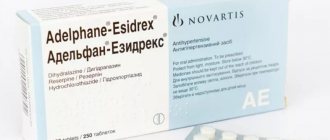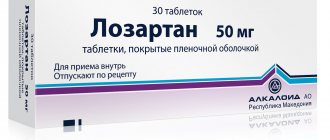Clonidine is a synthetic drug for blood pressure. For a long time it has been used in the medical field for the treatment of arterial hypertension, hypertensive crisis and a number of other pathologies. The drug Clonidine is effective and has pronounced antihypertensive properties. However, this drug has many contraindications and requires careful dosing, so it can only be used as prescribed by the attending physician, strictly following all the specialist’s recommendations!
Medicine information
The drug Clonidine belongs to the pharmacological group of alpha-adrenergic agonists. Has a powerful antihypertensive effect. It has vasodilating, analgesic, sedative and antispasmodic properties, which determine a wide range of uses of the drug.
Release form
The drug Clonidine is presented on the modern pharmaceutical market in three release forms:
- Tablets for oral use;
- Injection solution in ampoules;
- Drops.
The most popular drug for hypertension is the tablet form of the drug. Clonidine drops are used primarily for the treatment of ophthalmic diseases with a concomitant increase in intraocular pressure.
Packaging of clonidine tablets
Compound
The main active component of the drug is clonidine. The tablets contain 0.15 or 0.075 mg of this substance. The composition includes auxiliary ingredients such as lactose, magnesium stearate, starch.
The injection solution contains clonidine at a dosage of 0.1 mg per 1 ml of the drug.
Terms of sale and price
You can purchase Clonidine in pharmacy chains only upon presentation of an appropriate medical prescription. The cost of the drug is quite affordable and affordable. The average price for Clonidine is about 40 rubles. The exact cost depends on the form of release, the dosage of the active ingredient, the number of ampoules or capsules in the package.
Storage rules
It is recommended to store the blood pressure medication Clonidine at room temperature. It is important to find a shaded place for storage, protected from exposure to ultraviolet rays and inaccessible to small children and pets.
Release form and composition
Clonidine is available in the following dosage forms:
- Tablets (in dark glass or polymer jars of 50 pcs., 1 jar in a cardboard box; in blister packs of 10 pcs., 1, 2 or 5 packs in a cardboard box);
- Solution for intravenous administration (in ampoules of 1 ml with an ampoule knife, 10 ampoules in a cardboard box);
- Eye drops (in dropper tubes of 1.3 ml, 5 tubes in a cardboard box).
1 tablet contains:
- Active substance: clonidine – 0.075 or 0.15 mg (in the form of hydrochloride);
- Auxiliary components: lactose monohydrate (milk sugar) – 47.925/133.35 mg, potato starch – 11.4/15 mg, magnesium stearate – 0.6/1.5 mg.
The composition of 1 ml of solution for intravenous administration includes:
- Active substance: clonidine – 0.1 mg (in the form of hydrochloride);
- Auxiliary components: 0.1 M hydrochloric acid solution - up to pH 4-5.5, water for injection - up to 1 ml.
The composition of 1 ml eye drops includes:
- Active substance: clonidine – 1.25, 2.5 or 5 mg (in the form of hydrochloride);
- Auxiliary components: sodium chloride, sodium dihydrogen phosphate dihydrate, sodium hydrogen phosphate dodecahydrate, water for injection.
Pharmacological features - effect on blood pressure
Clonidine for lowering blood pressure is characterized by the presence of pronounced hypotensive properties. The drug also has the following therapeutic effects:
- Analgesic effect;
- Relief of panic states;
- Decreased heart rate;
- Normalization of blood and intraocular pressure;
- Positive effect on the condition and functioning of the central nervous system.
The pharmacological effect of Clonidine is due to the ability of the drug to stimulate certain brain receptors, which reduce the degree of conduction of impulses of the cardiovascular system and slow down reactions occurring in the body.
Thanks to these qualities, Clonidine lowers blood pressure and eliminates other clinical signs characteristic of arterial hypertension.
The medicine quickly reduces blood pressure and eliminates the symptoms of hypertension
Side effects
When using Clonidine orally and intravenously, the following side effects may develop (very often - from 1/10; often - from 1/100 to 1/10; infrequently - from 1/1000 to 1/100; rarely - from 1/10000 and up to 1/1000; very rarely - up to 1/10000, including isolated messages):
- Cardiovascular system: in rare cases, at the beginning of therapy - a short-term paradoxical increase in blood pressure; very often – orthostatic hypotension; uncommon – Raynaud's syndrome, sinus bradycardia; rarely - atrioventricular block; with unknown frequency – bradyarrhythmia;
- Digestive system: very often – dryness of the oral mucosa; often – constipation, nausea, loss of appetite, pain in the salivary glands, decreased gastric secretion, vomiting; rarely - pseudo-obstruction of the colon; with unknown frequency - hepatitis;
- Central nervous system: very often - drowsiness, dizziness, increased fatigue, slower speed of motor and mental reactions; often – sleep disturbances, nervousness, headache, depression; infrequently - paresthesia; rarely - impaired perception, asthenia, hallucinations, “nightmare” or vivid dreams; with unknown frequency – confusion;
- Respiratory system: rarely - dry nasal mucosa;
- Reproductive system: often – erectile dysfunction; with unknown frequency – decreased libido; rarely - gynecomastia;
- Skin: uncommon – rash (including urticaria), itching; rarely - alopecia;
- Sense organs: rarely – decreased tear production; with unknown frequency – disturbance of accommodation;
- Laboratory indicators: rarely – hyperglycemia; with unknown frequency – changes in liver function tests;
- Other: with unknown frequency - Raynaud's phenomenon, water and sodium retention, manifested by swelling of the ankles and feet; uncommon – nasal congestion; with a sudden o.
When using Clonidine in the form of eye drops, disorders such as bradycardia, weakness, dry mouth, drowsiness, excessive decrease in blood pressure, feeling of a foreign object or burning in the eye may occur.
What is Clonidine needed for?
Clonidine for high blood pressure is prescribed to patients with the following clinical indications:
- Hypertonic disease;
- Glaucoma;
- Drug addiction;
- Arterial hypertension;
- Alcoholism occurring in a chronic form;
- Depressive states;
- Moderately severe mental disorders.
Clonidine for hypertension is in most cases used as one of the components of complex drug therapy.
Cost of Clonidine
The drug is produced by many Russian and Ukrainian pharmaceutical factories. Its price category is quite affordable - a package of 50 tablets of 150 mg costs 22 hryvnia, 25 rubles, and 75 mg tablets cost 18 hryvnia, 23 rubles. Ampoules of 10 pieces per package will cost 110 hryvnia or 29 rubles. Identical drugs in composition are produced by foreign manufacturers - Gemiton, Catapressan, Giposin. Currently there is no registration for them, they are not available in the pharmacy chain.
We recommend reading the article about the use of the drug Liprazide. From it you will learn about the composition and properties of Liprazide, indications for use and dosage, as well as the cost and analogues of the drug. And here is more information about the drug Methyldopa.
Clonidine is an antihypertensive drug with a central mechanism of action. It is prescribed to a limited extent in the treatment of arterial hypertension, mainly for emergency care during a hypertensive crisis. It has a number of shelf-life effects; if used irregularly, it can cause a negative reaction.
It is especially dangerous in cases of widespread atherosclerosis due to the threat of deterioration of cerebral and coronary circulation. Due to its analgesic and sedative effects, it is used in the complex treatment of pain and withdrawal syndromes.
List of contraindications
Despite the fact that Clonidine reduces blood pressure quickly and effectively, the use of this drug is prohibited for patients with the following clinical contraindications:
- Blockage of cardiac conduction;
- Hypotonic disease (stably low blood pressure);
- Shock state of cardiogenic nature;
- Professional activities that require concentration and quick reactions;
- Depressive states and mental disorders occurring in acute, severe form;
- Treatment with antipsychotic drugs;
- Atherosclerosis of cerebral vessels;
- Porphyria;
- Pathologies of peripheral arteries;
- Severe sinus bradycardia;
- Inflammatory processes localized in the anterior chamber of the visual organs;
- Individual intolerance and hypersensitivity to the ingredients contained in the drug;
- Lactase deficiency;
- Raynaud's syndrome;
- Renal dysfunction;
- Serious disorders of peripheral circulatory processes;
- Lactose intolerance.
Clonidine is strictly contraindicated for people with high blood pressure who regularly drink alcohol, take antidepressants, or drugs containing ethanol.
Clonidine is not compatible with many drugs, so it can be taken strictly as prescribed by a doctor
Contraindications
The use of Clonidine is not recommended for the following diseases:
- individual intolerance to clonidine (the main active ingredient);
- arterial hypotension;
- pronounced signs of cerebrovascular accident;
- obliterating atherosclerosis of the lower extremities, endarteritis;
- slow heart rate - bradycardia, conduction blockade, weakness of the sinus node;
- vascular collapse;
- cardiogenic shock;
- depressive reactions or tendency to them;
- the need to use alcohol-containing drugs, ethanol (for example, as an antifoam in pulmonary edema), antidepressants, medications that inhibit brain activity.
The drug is contraindicated during pregnancy and breastfeeding. In diabetes mellitus, it can increase blood glucose levels and mask the signs of hypoglycemic attacks, which is extremely dangerous when taking insulin therapy and taking pills to treat diabetes. Taking hormonal contraceptives can enhance the inhibitory effect of Clonidine on the nervous system.
Is it possible during pregnancy and childhood?
Clonidine has the ability to penetrate the placental barrier, causing extremely adverse effects on fetal development.
The use of this drug in the first trimester of pregnancy is strictly prohibited. At later stages, the medicine is prescribed to expectant mothers only in exceptional cases in minimal dosages. In this case, the therapeutic process must take place under the constant, strict supervision of a qualified specialist.
It is forbidden for women to take Clonidine to reduce blood pressure during breastfeeding. The active ingredients of the drug penetrate into mother's milk and harm the baby. For this reason, during lactation, the patient should either stop using Clonidine or transfer the baby to artificial formula.
The drug is not used to treat young patients under 15 years of age. The optimal dosage and treatment regimen for adolescents is determined by a medical specialist on an individual basis. Most doctors do not recommend giving Clonidine to minor children.
How to take the drug for arterial hypertension
The instructions for use of Clonidine indicate that the optimal dose, release form and regimen of use of the drug should be determined by the doctor individually, taking into account all the features of a particular clinical case. The duration of the therapeutic course can last for several years.
It is important to take into account the fact that Clonidine is characterized by a withdrawal syndrome, manifested by sudden changes in blood pressure and even a hypertensive crisis. To avoid such undesirable complications, you should stop taking the drug gradually, gradually reducing the daily dosage in accordance with the regimen proposed by a medical specialist.
You should stop taking the drug according to the schedule suggested by your doctor.
Tablet form
It is recommended to take Clonidine tablets for blood pressure whole, without crushing or chewing, with a sufficient amount of clean water. The starting dosage for blood pressure and hypertension is 0.075 mg 1 to 4 times a day. In the absence of the proper therapeutic effect, the daily dose of the drug is gradually increased to 0.15 mg-0.3 mg 3-4 times throughout the day.
When treating patients with diagnosed heart failure, sclerosis, and the elderly, it is necessary to select the dosage especially carefully. This group of patients can take Clonidine for high blood pressure only under the condition of constant medical supervision and monitoring of their general condition. Otherwise, there is a high probability of developing dangerous complications such as stroke or myocardial infarction.
Injection
Clonidine injections are prescribed in the absence of proper results from the use of the tablet form of the drug. To lower blood pressure, an injection solution in ampoules is used.
Clonidine injections for blood pressure are given both subcutaneously and intramuscularly or intravenously. The doctor selects the optimal method of administering the drug individually, based on the general condition of the patient, the stage of development of the pathological process, and blood pressure indicators.
For intravenous injections, the drug is diluted with saline and administered smoothly, slowly, over at least 3-5 minutes. Otherwise, there is a high probability of a temporary increase in blood pressure, which is fraught with a hypertensive crisis and other adverse consequences.
This method of treatment requires medical supervision and regular monitoring of the patient’s heart rate, respiratory function, and skin condition.
For therapy at home, the use of Clonidine in tablets is allowed. Injections should only be given by an experienced doctor in a hospital.
Clonidine solution is more effective than the tablet form
At what pressure should you drink?
The drug is classified as an antihypertensive drug. It penetrates the blood-brain barrier to the cells of the vasomotor center and suppresses the flow of impulses aimed at narrowing the arteries. Under its influence, the level of peripheral vascular resistance and the release of stress hormones decrease. Due to its inhibitory effect on the brain, it has an analgesic and pronounced sedative effect.
When using Clonidine, systolic and diastolic blood pressure levels and pulse rate decrease. Long-term use reduces the load on the left ventricle and leads to the reverse development of myocardial hypertrophy. The prescription of the drug for mild to moderate hypertension is justified; it is indicated for patients with an increase in values over 140/90 mm Hg. Art., but not exceeding 180/115 mm Hg. Art.
To reduce the availability of Clonidine, subject-quantitative accounting has been introduced for it in pharmacies. This means that to purchase you need a prescription stamped by a doctor and a clinic or hospital. After purchase, the prescription remains in the pharmacy and is stored for at least 3 years.
This precaution is associated with the use of the drug for criminal purposes. Due to the wide range of new effective antihypertensive medications, doctors rarely prescribe Clonidine to patients; it has remained the drug of choice for hypertensive crisis.
Special instructions and recommendations
Clonidine is prescribed with great caution to patients suffering from diabetes mellitus, since this requires an increase in the dosage of hypoglycemic agents.
In cases of recent myocardial infarction or pathologies of the renal system, constant medical supervision and use of the drug in minimal doses are required.
Caution is also required when treating high blood pressure with Clonidine in people with diagnosed mental disorders, depression, and cerebral vascular pathologies.
To avoid adverse consequences, it is important for the patient to follow the treatment regimen recommended by the specialist. Even if the condition improves and blood pressure stabilizes, the drug should not be discontinued without permission. Dosage adjustment and completion period of the therapeutic course should be determined only by the attending physician. Otherwise, the likelihood of such dangerous complications as a hypertensive crisis, an excessive increase in blood pressure, accompanied by muscle spasms, headaches, nausea, and psycho-emotional disorders increases.
Therapy with Clonidine for persons suffering from drug or alcohol addiction is allowed only in hospitalization.
Indications for use
Clonidine can be used for systematic use for hypertension, as well as secondary hypertension associated with kidney disease. Most often it is administered intravenously during a crisis of high blood pressure. In addition to these main indications, for complex therapy the drug is prescribed for:
- spinal anesthesia to enhance its effect;
- severe pain syndrome and resistance to Morphine (its analogues) in cancer patients;
- carrying out differential diagnosis of pheochromocytoma (does not reduce blood pressure if it is present);
- migraine to prevent headache attacks;
- dysmenorrhea with severe pain in the lower abdomen;
- increased blood pressure, hot flashes during menopause;
- drug withdrawal syndrome;
- alcohol and nicotine addiction;
- glaucoma (in drops);
- attention deficit disorder in children, hyperactivity.
We recommend reading the article about relieving a hypertensive crisis. From it you will learn about what a hypertensive crisis is, as well as the actions of an ambulance doctor and the treatment of a crisis. And here is more information about the drug Anaprilin for arrhythmia.
Interaction with alcohol
The drug Clonidine is absolutely incompatible with alcohol. The simultaneous use of tablets and alcoholic beverages threatens the patient with the following consequences:
- Severe form of intoxication of the body;
- Reducing blood pressure to critical levels;
- Bradycardia (slow heartbeat);
- Coma;
- Heart failure.
The combination of Clonidine with alcohol can result in the death of the patient. Therefore, during the therapeutic course it is necessary to refrain from drinking alcoholic beverages and alcohol-containing drugs.
The combination of Clonidine with alcohol can result in the death of a person
Drug interactions
When Clonidine is used simultaneously with certain medications, the following effects may occur:
- Drugs that depress the central nervous system: development of depressive disorders and increased depressive effects on the central nervous system;
- Tricyclic antidepressants, sympathomimetic, anorexigenic (except fenfluramine) drugs, nifedipine and non-steroidal anti-inflammatory drugs: weakening of the hypotensive effect of Clonidine;
- Cardiac glycosides and beta-blockers: increased risk of developing bradycardia or (in some cases) atrioventricular block;
- Atenolol, propranolol: development of additive hypotensive effect, sedation, dry mouth;
- Levodopa, piribedil: decrease in their effectiveness;
- Diuretics, vasodilators, antihistamines: increased hypotensive effect of Clonidine;
- Prazosin: modification of the antihypertensive effect of clonidine;
- Cyclosporine: increase in its concentration in blood plasma;
- Hormonal contraceptives for oral administration: increased sedative effect of clonidine;
- Tolperisone: enhanced muscle relaxant effect;
- Tofisopam: enhanced anxiolytic effect;
- Phenylephrine: increased pressor effect;
- Mirtazapine: development of hypertensive crisis;
- Haloperidol: increased central nervous system depression;
- Sulpiride: enhancing the effect of clonidine;
- Insulin, hypoglycemic agents for oral administration: weakening of the hypoglycemic effect of Clonidine.
Adverse reactions
The use of the drug Clonidine may cause the following adverse reactions:
- Sleep disturbances, nightmares;
- Increased drowsiness;
- Lethargy, apathy, decreased ability to work;
- Slowing heart rate;
- Feeling of constant dryness in the mouth;
- Nausea and vomiting;
- Chronic fatigue syndrome;
- Gaining extra pounds;
- Constipation;
- Dizziness;
- Impaired coordination of movements.
Most unwanted reactions go away on their own within a few days. Otherwise, you should seek advice from a specialist, but do not stop taking the drug without permission!
Drug overdose
Exceeding the recommended doses of the drug provokes Clonidine poisoning, manifested by the following symptoms:
- Constriction of the pupils;
- Fainting;
- A sharp decrease in blood pressure;
- Vomit;
- Slow heartbeat;
- Pallor of the skin;
- Decreased body temperature;
- Respiratory dysfunction;
- Coma.
An overdose of Clonidine can lead to such deadly consequences as collapse, cardiac arrest, stroke, and myocardial infarction.
Therefore, at the first alarming symptoms, it is necessary to call an ambulance, and before the doctors arrive, give the patient a gastric lavage and give a dose of sorbents.










